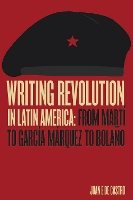Writing Revolution in Latin America: From Marti to Garcia Marquez to BolanoAuthor :
Paperback
Published : Friday 30 August 2019
You may also like ...

by
Paperback
30 Aug 2019
>>
€39.70
Extended stock - Dispatch 5-7 days
Description
In the politically volatile period from the 1960s through the end of the twentieth century, Latin American authors were in direct dialogue with the violent realities of their time and place. This volume is a chronological study of the way revolution and revolutionary thinking is depicted in the fiction composed from the eye of the storm.
In the politically volatile period from the 1960s through the end of the twentieth century, Latin American authors were in direct dialogue with the violent realities of their time and place. Writing Revolution in Latin America is a chronological study of the way revolution and revolutionary thinking is depicted in the fiction composed from the eye of the storm. From Mexico to Chile, the gradual ideological evolution from a revolutionary to a neoliberal mainstream was a consequence of, on the one hand, the political hardening of the Cuban Revolution beginning in the late 1960s, and on the other, the repression, dictatorships, and economic crises of the 1970s and beyond. Not only was socialist revolution far from the utopia many believed, but the notion that guerrilla uprisings would lead to an easy socialism proved to be unfounded. Similarly, the repressive Pinochet dictatorship in Chile led to unfathomable tragedy and social mutation. This double-edged phenomenon of revolutionary disillusionment became highly personal for Latin American authors inside and outside Castro's and Pinochet's dominion. Revolution was more than a foreign affair, it was the stuff of everyday life and, therefore, of fiction. Juan De Castro's expansive study begins ahead of the century with Jose Marti in Cuba and continues through the likes of Marios Vargas Llosa in Peru, Gabriel Garcia Marquez in Columbia, and Roberto Bolano in Mexico (by way of Chile). The various, often contradictory ways the authors convey this precarious historical moment speaks in equal measure to the social circumstances into which they were thrust and to the fundamental differences in the way the authors themselves interpreted history.
Reviews